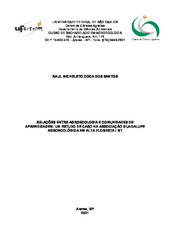Relações entre Agroecologia e Comunidades de Aprendizagem: um estudo de caso na Associação Guadalupe Agroecológica (Alta Floresta, MT)
Abstract
Agribusiness and the conventional agricultural production method are
associated with a series of environmental impacts, resulting in the loss of
habitats, contamination of water and soil resources, desertification of large
areas, among others. In view of this, in recent decades there has been a
growing number of people, both individuals and collectives, seeking to promote
changes in society through greater sustainability and critical thinking. Among
the various forms of collective action are communities, ecovillages, quilombos
and rural and urban settlements, with agroecology being an important
theoretical and practical basis. In the field of education, Learning Communities
appear as an alternative to the traditional way of teaching, promoting a school
functioning that brings together fathers, mothers, family members and residents
of the surroundings of the school. In this sense, the present work aimed to
present concepts related to Learning Communities, linking them to the notion of
agroecology, using for this the bibliographical research in the area and a case
study carried out from a field experience carried out in 2020 in the Nossa
community Senhora do Guadalupe, municipality of Alta Floresta – MT. It was
observed that the investigated community, consisting of about 50 families,
founded the Guadalupe Agroecological Association (AGuA) in 2014 as a way of
facing the social and environmental challenges arising from agriculture that is
strongly present in the area. In 2014, the Ciranda da Terra community school
was created, which is included in the field of Learning Communities. It is
concluded that agroecology and Learning Communities are two pillars for the
studied community, shaping their practices and values in line with the
construction of a more tolerant, egalitarian and sustainable society.
Collections
The following license files are associated with this item:

